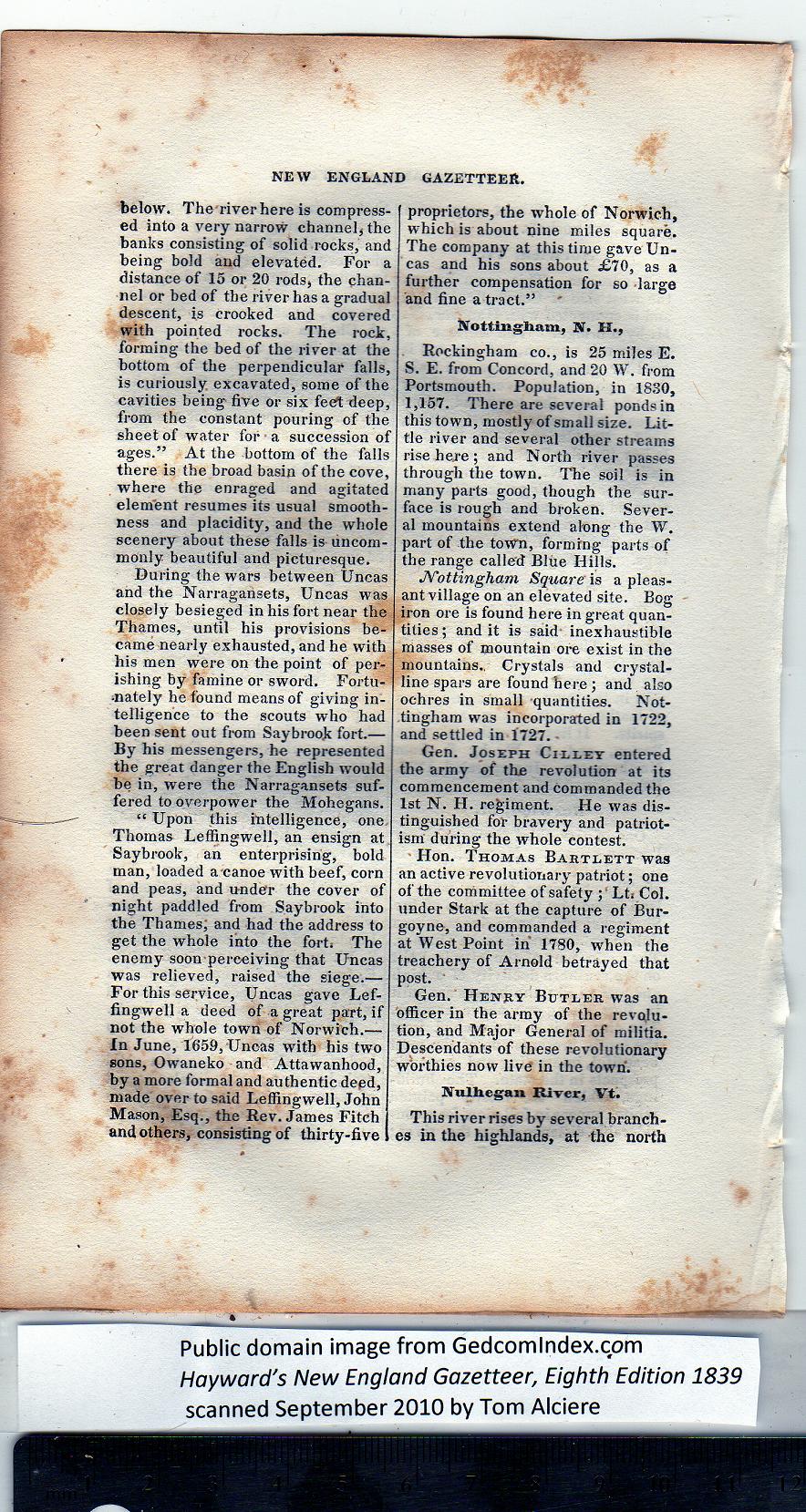|
below. The river here is compress-
ed into a very narrow channel, the
banks consisting of solid rocks, and
being bold and elevated. For a
distance of 15 or 20 rods, the chan-
nel or bed of the river has a gradual
descent, is crooked and covered
with pointed rocks. The rock,
forming the bed of the river at the
bottom of the perpendicular falls,
is curiously excavated, some of the
cavities being five 01* six feert: deep,
from the constant pouring of the
sheet of water for a succession of
ages.” At the bottom of the falls
there is the broad basin of the cove,
where the enraged and agitated
element resumes its usual smooth-
ness and placidity, and the whole
scenery about these falls is uncom-
monly beautiful and picturesque.
During the wars between Uncas
and the Narragansets, Uncas was
closely besieged in his fort near the
Thames, until his provisions be-
came nearly exhausted, and he with
his men were on the point of per-
ishing hy famine or sword. Fortu-
•nately he found means of giving in-
telligence to the scouts who had
been sent out from Saybrook fort.—
By his messengers, he represented
the great danger the English would
be in, were the Narragansets suf-
fered to overpower the Mohegans.
“ Upon this intelligence, one
Thomas Leffingwell, an ensign at
Saybrook, an enterprising, bold
man, loaded a canoe with beef, corn
and peas, and under the cover of
night paddled from Saybrook into
the Thames; and had the address to
get the whole into the fort* The
enemy soon perceiving that Uncas
was relieved, raised the siege.—
For this service, Uncas gave Lef-
fingwell a deed of a great part, if
not the whole town of Norwich.—
In June, 1659, Uncas with his two
sons, Owaneko and Attawanhood,
by a more formal and authentic deed,
made over to said Leffingwell, John
Mason, Esq., the Rev. James Fitch
and others, consisting of thirty-five
proprietors, the whole of Norwich,
which is about nine miles square.
The company at this time gave Un-
cas and his sons about £70, as a
further compensation for so large
and fine a tract.” |
Nottingham, N. H.,
Rockingham co., is 25 miles E.
S. E. from Concord, and 20 W. from
Portsmouth. Population, in 1830,
1,157. There are several ponds in
this town, mostly of small size. Lit-
tle river and several other streams
rise here; and North river passes
through the town. The soil is in
many parts good, though the sur-
face is rough and broken. Sever-
al mountains extend along the W.
part of the town, forming parts of
the range called Blue Hills.
Nottingham Square is a pleas-
ant village on an elevated site. Bog
iron ore is found here in great quan-
tities ; and it is said- inexhaustible
masses of mountain 01*6 exist in the
mountains. Crystals and crystal-
line spars are found here ; and also
ochres in small quantities. Not-
tingham was incorporated in 1722,
and settled in 1727.
Gen. Joseph Cillet entered
the army of the revolution at its
commencement and commanded the
1st N. H. regiment. He was dis-
tinguished for bravery and patriot-
ism during the whole contest.
Hon. Thomas Bartlett was
an active revolutionary patriot; one
of the committee of safety j LL Col.
under Stark at the capture of Bur-
goyne, and commanded a regiment
at West Point in 1780, when the
treachery of Arnold betrayed that
post.
Gen. Henry Butler was an
officer in the army of the revolu-
tion, and Major General of militia.
Descendants of these revolutionary
worthies now live in the town.
Nulhegan River, Vt.
This river rises by several branch-
es in the highlands, at the north |
